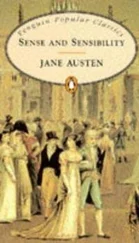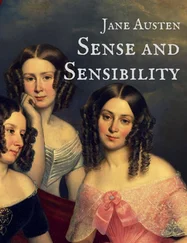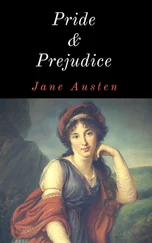Джейн Остин
Sense and Sensibility / Чувство и чувствительность. Уровень 3
© Матвеев С. А., адаптация, словарь, 2022
© ООО «Издательство АСТ», 2022
The family of Dashwood had long been settled in Sussex. Their estate was large, and their residence was at Norland Park, in the centre of their property, where, for many generations, they had lived. The late owner of this estate was a single man, who for many years of his life had a constant companion and housekeeper in his sister. But her death, which happened ten years before his own, produced a great alteration in his home. He invited and received into his house the family of his nephew Mr. Henry Dashwood, the legal inheritor [1] legal inheritor – законный наследник
of the Norland estate. In the society of his nephew and niece, and their children, the old Gentleman’s days were comfortably spent.
By a former marriage, Mr. Henry Dashwood had one son: by his present lady, three daughters. The son was provided for by the fortune of his mother, which had been large. By his own marriage, he added to his wealth. To him therefore the succession to the Norland estate was not so really important as to his sisters.
The old gentleman died: his will was read, and gave as much disappointment as pleasure. He left his estate to his nephew; but he left it to him on such terms as destroyed half the value of the bequest. Mr. Dashwood had wished for it more for the sake of his wife and daughters than for himself or his son. But to his son, and his son’s son, a child of four years old, it was secured. As a mark of his affection for the three girls, the old gentleman left them three thousand pounds.
Mr. Dashwood’s disappointment was, at first, severe; but his temper was cheerful and sanguine. He hoped to live many years, but the fortune was his only one year. He survived his uncle no longer. Ten thousand pounds was all that remained for his widow and daughters.
His son was sent for [2] his son was sent for – послали за его сыном
, and to him Mr. Dashwood recommended his mother-in-law and sisters. Mr. John Dashwood promised to do everything to make them comfortable, for example, to give them three thousand pounds from the fortune. He was not an ill-disposed young man. But Mrs. John Dashwood was a caricature of himself; narrow-minded and selfish.
No sooner was his father’s funeral over, than Mrs. John Dashwood arrived with her child and their attendants. Of course, the house was her husband’s from the moment of his father’s decease; but the indelicacy of her conduct was great.
Mrs. Dashwood felt this ungracious behaviour, and she earnestly despised her daughter-in-law. But her own tender love for all her three children determined her afterwards to stay, and for their sakes avoid a breach with their brother.
Elinor, the eldest daughter, possessed a strength of understanding, and coolness of judgment, which qualified her, though only nineteen, to be the counsellor of her mother.
Marianne was the second sister. Marianne’s abilities were, in many respects, quite equal to Elinor’s. She was sensible and clever; but eager in everything: her sorrows, her joys, had no moderation. She was generous, amiable, interesting. The resemblance between her and her mother was strikingly great.
Margaret, the third sister, was thirteen. She was a good-humored, well-disposed girl; but she had already imbibed a good deal of Marianne’s romance.
Mrs. John Dashwood now installed herself mistress of Norland. Her mother and sisters-in-law were degraded to the condition of visitors. However, they were treated by her with quiet civility; and by her husband with kindness. He really pressed them to consider Norland as their home. Mrs. Dashwood remained there till she could accommodate herself with a house in the neighbourhood, so his invitation was accepted.
Mrs. John Dashwood did not at all approve of what her husband intended to do for his sisters. To take three thousand pounds from the fortune of their dear little boy will be dreadful! She begged him to think again on the subject. How can he rob his child of so large a sum? Those young Dashwoods were related to him only by half blood (which she considered as no relationship at all)! Why did he want to ruin himself, and their poor little Harry, by giving away all his money to his half sisters?
“It was my father’s last request to me,” replied her husband, “I must assist his widow and daughters.”
“He did not know what he was talking of, I dare say. Sure, he was a little bit crazy then: to give away half your fortune from your own child!”
“He did not stipulate for any particular sum, my dear Fanny. He only requested me, in general terms, to assist them, and make their situation comfortable. He required the promise, and I gave it. The promise must be performed. Something must be done for them whenever they leave Norland and settle in a new home.”
“Well, then, let something be done for them; but that something need not be three thousand pounds. Consider,” she added, “that when the money is once parted with, it never can return. Your sisters will marry, and it will be gone for ever. If, indeed, it will be restored to our poor little boy – ”
“Yes,” said her husband, very gravely, “that will make great difference. The time may come when Harry will regret that. If he has a numerous family, for instance…”
“Sure.”
“Perhaps, then, it will be better… five hundred pounds will be enough for them!”
“Oh! What brother on earth does half so much for his sisters! And for half blood sisters! You have such a generous spirit!”
“I think I may afford to give them that money: five hundred pounds to every sister.”
“Perhaps they do not even want that. If they marry, they will have rich husbands, and if they do not, they may all live very comfortably together.”
“That is very true. And what to do for their mother? Something of the annuity kind I mean. A hundred a year would make them all perfectly comfortable.”
His wife hesitated a little.
“To be sure,” said she, “it is better than parting with fifteen hundred pounds at once. But, then, if Mrs. Dashwood lives fifteen years we shall lose the money anyway.”
“Fifteen years! My dear Fanny; her life won’t be so long.”
“Certainly not; but if you observe, people always live for ever when there is an annuity. She is very stout and healthy, and hardly forty. An annuity is a very serious business. You are not aware of what you are doing.”
“It is certainly an unpleasant thing,” replied Mr. Dashwood. “To be tied down to the regular payment of such a sum, on every rent day, is by no means desirable. It takes away one’s independence.”
“Undoubtedly; and after all you have no thanks for it. And it may be very inconvenient to spare a hundred, or even fifty pounds from our own expenses.”
“I believe you are right, my love; it will be better that there must be no annuity. A present of fifty pounds, now and then, will be enough, I think.”
“To be sure it will. Indeed, to say the truth, I am convinced within myself that your father had no idea of your giving them any money at all. The assistance he thought of, I dare say, was, for instance, looking out for a comfortable small house for them, helping them to move their things, and sending them presents, and so forth.”
“Yes,” said Mr. Dashwood, “I believe you are perfectly right. My father certainly meant nothing more by his request to me than what you say. I clearly understand it now!”
Читать дальше



![Джейн Остин - Sense and Sensibility [С англо-русским словарем]](/books/26612/dzhejn-ostin-sense-and-sensibility-s-anglo-thumb.webp)








